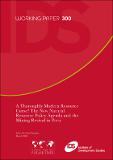| dc.description.abstract | The reality of the so-called ‘resource curse’ is now widely accepted. The
populations of countries that possess significant natural resources often suffer
when these resources are extracted and exported. Attention is turning to ways of
mitigating the adverse effects of the ‘curse’. Responsible fiscal policies are
required but are in themselves insufficient for overcoming it. International
institutions have recently advanced what I term the ‘new natural resource policy
agenda’ to deal with the problem. Its core features are (a) decentralisation of
government (b) a greater role for direct citizen participation in the allocation of
mining revenue; and (c) more cooperation between state agencies and
commercial organisations (public-private partnerships). However, the recent
history of Peru poses major questions about the effectiveness of this new policy
agenda. The government has adopted both conservative fiscal policies and the
new policy agenda. Over the last five years the mineral price boom has increased
mining revenues markedly, but it has had little impact on poverty. More important,
local level conflicts around mining operations have increased, and appear to
threaten political instability even more. The problem is that, in a context of weak
central state and even weaker local governments, the ‘new natural resource policy
agenda’ has partially re-located the resource curse to sub-national levels. Local
governments, mining companies and a variety of activist movements are locked
into complex relationships that are not easy to negotiate and into conflicts that are
not easily resolved. Like its predecessors, this very contemporary manifestation of
the resource curse results in poor quality public expenditure and the waste of
much of the new resource revenue.
Keywords: mining, resource curse, decentralisation, participation, local
government, social movement, conflict. | en_GB |

